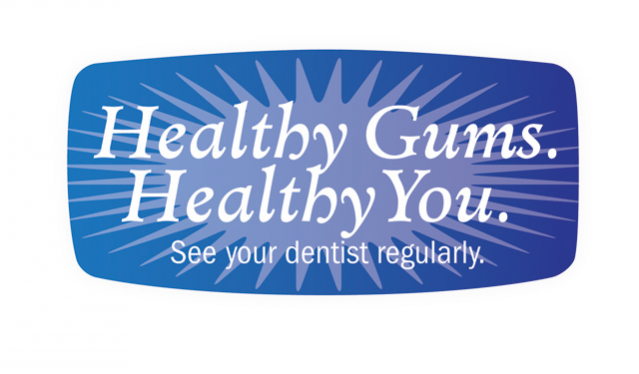Healthy Gums, Healthy You
The mouth is vital for so much that we do….from talking to eating to smiling or frowning. The mouth is also a gateway to the entire body – a connector to overall health. The MDA’s dental education campaign, Healthy Gums, Healthy You, demonstrates the impact that your oral health can have on your overall health and well-being. Growing evidence shows an association between periodontal (gum) disease and other serious medical problems, including heart disease, diabetes, and adverse pregnancy outcomes.

What is Gum Disease?
Periodontal (gum) disease begins when bacteria (a sticky biofilm that forms on teeth) produce toxins that irritate the gums. If the plaque is not removed daily through brushing and flossing, gum tissues may break down and become red, tender and likely to bleed.
The early stage of periodontal disease is called gingivitis. Gingivitis is treatable and reversible. However, if it is left untreated, it may progress into a serious condition called chronic periodontitis, a bacterial infection in the pockets around teeth. The bacteria and resulting tissue inflammation cause a breakdown of the gum tissue and bone, and eventually teeth become loose, fall out, or need to be removed.
Warning Signs of Gum Disease
Regular dental visits will help your dentist detect early signs of gum disease and suggested treatment options. Warning signs are:
- Bleeding gums during toothbrushing and flossing
- Red, swollen and tender gums
- Persistent bad breath or unpleasant taste in mouth
- Gums that have receded or pulled away from your teeth
- Loose or separating teeth
- Pus between the tooth and gum
- A change in your bite
How healthy are your gums?
The American Academy of Periodontology developed patient resources on periodontal disease and gum disease risk factors. If you have questions, please talk to your dentist or find a member dentist. If you have questions, please talk to your dentist or find a member dentist.
Health risks
How is gum disease associated with heart disease?
Left untreated, gum disease can not only lead to tooth loss, but can increase your risk for other diseases linked to inflammation, including cardiovascular (heart) disease. Evidence shows that mouth bacteria between the gum and tooth can enter the bloodstream, potentially attaching to blood vessels. This can increase the risk for heart disease, artery blockage and stroke. Other studies suggest that chronic inflammation can lead to dysfunction of the infected tissues and severe health complications. Regardless, whether you have gum disease or heart disease, researchers today believe that having one may increase your risk for developing the other.
How is gum disease associated with diabetes?
Gum disease is a leading complication of diabetes. In fact, an estimated one-third of the 24 million Americans with diabetes develop gum disease – a rate three to four times higher than people without diabetes. Left untreated, gum disease can damage the tissues and bone surrounding the teeth and lead to tooth loss.
Diabetes is a serious disease in which the body does not produce or properly use insulin, a hormone that is needed to convert food into energy. Keeping the disease under control is critical, and some research suggests that people with diabetes who take care of their gums are better able to control their blood sugar levels. Because diabetics have a higher chance of developing gum disease, it is essential to maintain good oral health and have your dentist provide preventive treatment options.
Gum disease and pregnancy
Studies have suggested that women who have gum disease during pregnancy may be at increased risk for having premature or low birth weight babies. In addition, these women may be twice as likely to develop preeclampsia, characterized by high blood pressure. The good news: some research shows that these complications may be reduced through proper oral health care and early treatment of gum disease. Ask your dentist for more information.
Prevention Connection: What can you do?
Prevention is key to maintaining good oral health and avoiding the risk of gum disease and other possible systemic conditions. The following tips are suggested for regular preventive care:
- Brush your teeth twice a day. Be sure to clean between teeth with floss or other type of interdental cleaner daily.
- Schedule regular dental checkups and cleanings. Routine dental visits (twice a year or more) can detect early signs of gum disease and provide early treatment options.
- Eat a balanced diet and limit snacks that may contribute to tooth decay and gum disease.
- Tell your dentist about changes in your health.
- If you smoke, seek help with quitting. Smoking can worsen gum problems.
- If you are diabetic, tell your dentist about your diabetes, medication(s) you take, whether you are insulin-dependent, and what your baseline sugar level is.
- If you are pregnant or thinking of becoming pregnant, pay particular attention to your oral hygiene. Hormonal changes can exaggerate some dental problems.